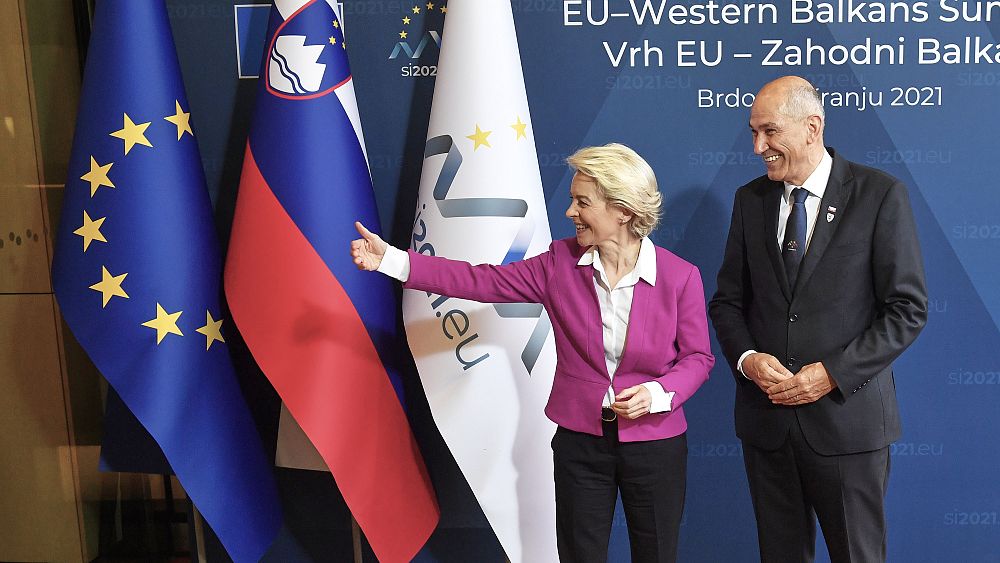
The European Union has pledged €9 billion for the Western Balkans as part of a new economic and investment plan but political divisions over the prospect of accession remain entrenched.
The new commitment comes as European leaders met in Brdo pri Kranju, Slovenia, for an EU-Western Balkans summit that was also attended by the heads of government of Albania, Bosnia and Herzegovina, Serbia, Montenegro, North Macedonia and Kosovo.
As of today, Albania, North Macedonia, Montenegro and Serbia are officially recognised as candidates to EU membership, while Bosnia and Kosovo are seen as potential applicants. Albania and North Macedonia are the most advanced of the group, but a dispute between Skopje and the current Bulgarian government has effectively blocked the process. The impasse has shed further light on the slow pace of EU accession.
Mindful that patience is wearing thin in the Balkans, Slovenia, the current holder of the EU’s rotating presidency, convened the special summit in Brdo to directly address the question of enlargement. But not every member state shares Slovenia’s appetite for welcoming new members in the 27-strong club.
The final communiqué of the high-level meeting simply reaffirms the EU’s “unequivocal support for the European perspective of the Western Balkans” without any specific deadline or time limit, let alone any compromise from Bulgaria to break the deadlock.
“The European Union is not complete without the Western Balkans,” said Ursula von der Leyen, President of the European Commission, adding that the “vast majority” of EU countries expressed their support for enlargement, “even the most sceptical ones”, which she did not name.
The failure to open negotiations with North Macedonia and Albania is “jeopardising our standing and leverage in the region,” von der Leyen remarked.
Standing next to her, Charles Michel, President of the European Council, underlined the strategic importance of the Western Balkans and the clear consensus around the leaders’ table.
Both presidents, however, admitted that “key issues” like fundamental values, rule of law, justice, media freedom and the fight against corruption and organised crime remain roadblocks for accession. The leaders praised the reforms that the Balkan countries have so far undertaken in this regard but added the six nations still have work to do.
“In all frankness, there is an ongoing discussion among the 27 about our capacity to welcome new member states,” said Michel.
In order to support reforms, EU leaders agreed to set up a new economic and investment plan for the Western Balkans to help the region improve its competitiveness and accelerate the green and digital transitions – in line with the EU’s own agenda. The bloc has pledged €9 billion in grants, which Brussels says have the potential of mobilising up to €20 billion in investments.
The communiqué includes other commitments in the fields of climate action, connectivity, transport, market integration, research and innovation, as well as a roadmap to lower roaming charges between the EU and the Western Balkans.
The bloc also promises to provide the region with more anti-coronavirus vaccines, although without guaranteeing any specific number.
So far, the EU has delivered over 2.9 million shots and €3.3 billion in health and economic support against the pandemic.
Commitments to deepen cooperation are also made in the field of foreign policy and security, including disinformation, hybrid threats, migration, human trafficking, terrorism and radicalisation.
EU leaders expect the Western Balkans to “fully align” with its foreign policy positions and “act accordingly”. The bloc is wary of the growing influence of Russia and China across the region, which many fear will grow as the prospect of accession languishes.
“We share the same history, the same interests and values,” said von der Leyen. “I’m deeply convinced we also share the same destiny”.
Slovenian Prime Minister Janez Janša, who hosted the summit, called the meeting a “milestone” and compared its significance to that of the 2003 Thessaloniki summit when the EU officially recognised the Western Balkans as potential candidates for EU membership.
The summit was preceded by an informal dinner where EU leaders had a chance to discuss a topic of greater importance and urgency for citizens: the soaring prices of electricity.
Countries like France, Italy and Spain are calling for decisive EU-wide solutions, like a common strategic gas reserve, but Brussels and Northern states are urging caution, preferring instead temporary and targeted measures at the national level.